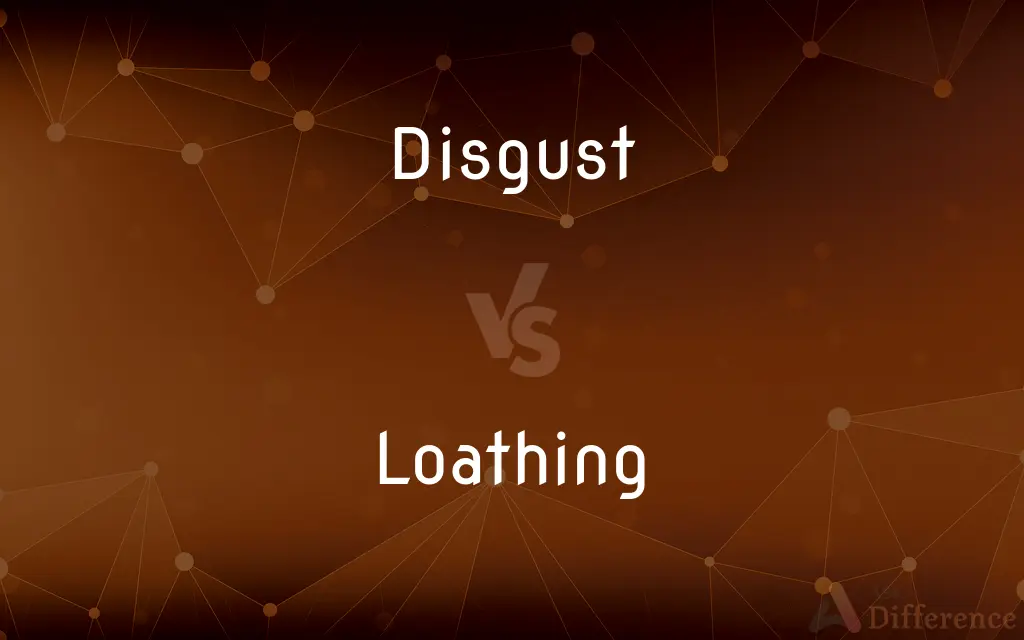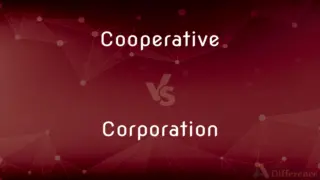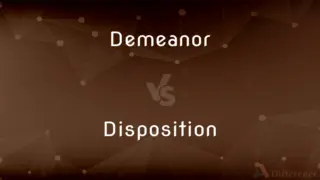Disgust vs. Loathing — What's the Difference?
Edited by Tayyaba Rehman — By Maham Liaqat — Updated on May 6, 2024
Disgust is a strong feeling of aversion or repulsion towards something perceived as unpleasant, while loathing is an intense, often deep-seated feeling of hatred or abhorrence.

Difference Between Disgust and Loathing
Table of Contents
ADVERTISEMENT
Key Differences
Disgust is a response to something offensive or distasteful, often accompanied by physical reactions like nausea, whereas loathing is a more profound emotional response that conveys strong hatred or revulsion.
Disgust typically focuses on sensory triggers like sight, smell, or taste, causing immediate rejection, while loathing tends to be linked to moral or personal beliefs, eliciting a deep-seated avoidance.
Disgust can be momentary and often triggered by external stimuli like rotten food, whereas loathing usually implies a longer-lasting negative feeling that can persist even without immediate stimuli.
Disgust might inspire avoidance or distancing from an unpleasant source, while loathing often motivates stronger rejection, sometimes translating to hostile attitudes.
Disgust is more surface-level and fleeting, while loathing represents a deeper emotional state that may be difficult to overcome once entrenched.
ADVERTISEMENT
Comparison Chart
Intensity
Strong aversion, generally moderate
Intense hatred or abhorrence
Duration
Temporary, often brief
Longer-lasting and deep-seated
Triggers
Sensory stimuli like smell, taste, or sight
Moral beliefs or personal experiences
Reactions
Physical responses (e.g., nausea)
Psychological responses (e.g., hatred)
Emotional Depth
Surface-level aversion
Deep, ingrained, and persistent dislike
Compare with Definitions
Disgust
Strong aversion or dislike.
She felt disgust upon seeing moldy bread.
Loathing
Intense, deep-seated hatred.
She felt loathing towards those who bullied her.
Disgust
Reaction to something unpleasant.
The dirty bathroom filled him with disgust.
Loathing
Profound dislike with a moral basis.
Loathing for exploitation drove him to speak out.
Disgust
Emotional response to offensive behavior.
The lies in the politician's speech caused disgust.
Loathing
Persistent aversion with strong emotions.
He couldn't hide his loathing for the corrupt officials.
Disgust
Physiological reaction involving repulsion.
The strong smell made her wrinkle her nose in disgust.
Loathing
Persistent state of abhorrence.
His loathing for dishonesty shaped his career choices.
Disgust
Moral objection to unethical actions.
Disgust at corruption led him to resign.
Loathing
Emotional rejection of a concept or person.
The activist's loathing for inequality inspired her protest.
Disgust
Disgust (Middle French: desgouster, from Latin gustus, "taste") is an emotional response of rejection or revulsion to something potentially contagious or something considered offensive, distasteful, or unpleasant. In The Expression of the Emotions in Man and Animals, Charles Darwin wrote that disgust is a sensation that refers to something revolting.
Loathing
Great dislike; abhorrence.
Disgust
To excite nausea or loathing in; sicken.
Loathing
Sense of revulsion, distaste, detestation, extreme hatred or dislike.
The man's loathing of his former friend was palpable; you could feel how much he now hated him.
Disgust
To offend the taste or moral sense of; repel.
Loathing
Present participle of loathe
Disgust
Profound dislike or annoyance caused by something sickening or offensive.
Loathing
(obsolete) loath
Disgust
To cause an intense dislike for something.
It disgusts me to see her chew with her mouth open.
Loathing
Extreme disgust; a feeling of aversion, nausea, abhorrence, or detestation.
The mutual fear and loathing of the hostile races.
Disgust
An intense dislike or loathing someone feels for something bad or nasty.
With an air of disgust, she stormed out of the room.
Loathing
Hate coupled with disgust
Disgust
To provoke disgust or strong distaste in; to cause (any one) loathing, as of the stomach; to excite aversion in; to offend the moral taste of; - often with at, with, or by.
To disgust him with the world and its vanities.
Ærius is expressly declared . . . to have been disgusted at failing.
Alarmed and disgusted by the proceedings of the convention.
Disgust
Repugnance to what is offensive; aversion or displeasure produced by something loathsome; loathing; strong distaste; - said primarily of the sickening opposition felt for anything which offends the physical organs of taste; now rather of the analogous repugnance excited by anything extremely unpleasant to the moral taste or higher sensibilities of our nature; as, an act of cruelty may excite disgust.
The manner of doing is more consequence than the thing done, and upon that depends the satisfaction or disgust wherewith it is received.
In a vulgar hack writer such oddities would have excited only disgust.
Disgust
Strong feelings of dislike
Disgust
Fill with distaste;
This spoilt food disgusts me
Disgust
Cause aversion in; offend the moral sense of;
The pornographic pictures sickened us
Common Curiosities
Can disgust lead to loathing?
Yes, repeated exposure to something disgusting can lead to long-term loathing.
Is loathing more intense than disgust?
Generally, yes. Loathing involves a deeper and more ingrained emotional response.
Is disgust always accompanied by physical reactions?
Not always, but it often includes facial expressions or nausea.
Does loathing involve moral judgment?
Often, yes. Loathing is frequently tied to personal or societal beliefs.
Can disgust be mild?
Yes, disgust can range from mild irritation to strong aversion.
Can loathing be reversed easily?
No, it tends to be deep-rooted and requires significant effort to change.
Are disgust and loathing universal emotions?
Both are recognized across cultures, but triggers vary.
Can disgust be momentary?
Yes, disgust can be a brief, immediate response to unpleasant stimuli.
Can loathing be developed quickly?
It's possible but typically develops over time due to repeated exposure or strong negative experiences.
Is loathing ever considered justifiable?
It can be seen as a protective response, though the appropriateness is subjective.
Can disgust be a useful emotion?
Yes, it can protect against harmful or unclean situations.
Can one feel both disgust and loathing simultaneously?
Yes, one might experience immediate disgust while harboring deeper loathing.
Does loathing typically involve a target person or thing?
Yes, loathing is usually directed at something specific.
Is loathing more personal than disgust?
Often, loathing is directed toward specific individuals or groups.
Can disgust be experienced towards ideas or concepts?
Yes, people can feel disgust towards offensive or immoral ideas.
Share Your Discovery

Previous Comparison
Cooperative vs. Corporation
Next Comparison
Demeanor vs. DispositionAuthor Spotlight
Written by
Maham LiaqatEdited by
Tayyaba RehmanTayyaba Rehman is a distinguished writer, currently serving as a primary contributor to askdifference.com. As a researcher in semantics and etymology, Tayyaba's passion for the complexity of languages and their distinctions has found a perfect home on the platform. Tayyaba delves into the intricacies of language, distinguishing between commonly confused words and phrases, thereby providing clarity for readers worldwide.
















































